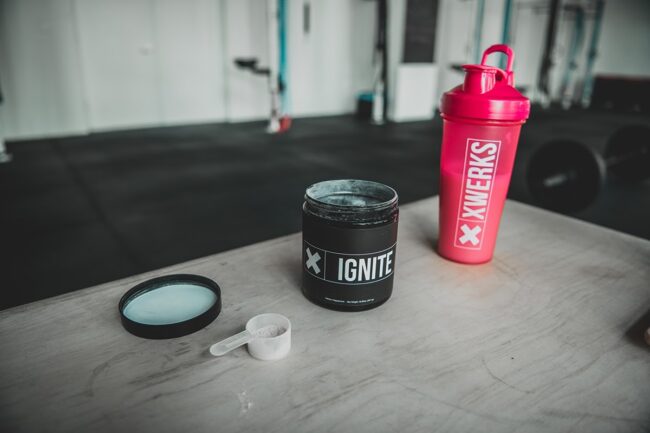For most people that work out regularly, supplements are an essential part of their overall program. The convenience and the size (and often the comprehensiveness) is a big help in getting in all the nutrients, minerals and vitamins that are lacking from the average daily diet. In fact, you don’t even have to be working out to gain from using some of them. If you are working out or competing in physical events, though, supplements such as creatine, (whey) protein and pre workout concoctions are important if you want to maximize your productivity and recovery time.
There are tons of supplement options on the market; in this article, we will restrict discussion to a handful of the most useful ones. These will be backed up by medical research papers that highlight their utility. You will learn the specific things for which a particular supplement is most useful, and how much of it to take in grams or milligrams.
Pre Workout Creatine
One of the most popular supplements out there is creatine; you will find that it is heavily used by bodybuilders. It becomes clear why, once you understand what it does and how it functions. First of all, creatine is a naturally-occurring substance that is produced by your cells for the purposes of energy infusion. In fact, you can think of it as a sort of cellular auxiliary battery that works in conjunction with adenosine diphosphate (ADP).
So – what does creatine do, exactly? When you use your muscles, you are slowly (or quickly, in explosive activities) draining them of their fuel supply. Creatine is an actual molecule that is produced naturally inside of your cellular structure, and it provides extra energy to help you power through a workout. It has been proven that creatine supports muscle building, muscle recovery and increased strength; in fact, to the tune of between 5% and 10% when compared to weightlifters who workout but don’t use creatine. Those who experienced the increase took creatine as a supplement over a long, structured period of time during which they engaged in a strength-building program.
The creatine infuses your muscles with energy; which can be held in reserve until your muscles have to undergo strenuous exercise. You will find that you have a heightened capacity when you lift weights, which allows you to perform more reps at heavier weight. This will stress your muscles and, during the post-workout recovery period, they will grow stronger and bigger than they would have otherwise.
The recommended amount of creatine to take as a pre workout supplement is 20 grams per day; this, however, is only for beginners in a so-called “loading phase”. Make sure to divide the 20 grams evenly and take in 3-4 scoops throughout the day. Afterwards, you can reduce this intake to 3-5 grams of creatine every single day to keep your cells filled with energy.
Combat Acid Buildup with Beta-Alanine
If you work out regularly, then you’ve doubtless experienced the buildup of lactic acid that eventually makes you stop to take a break. Your muscles have become fatigued through the depletion of the glycogen stores that keep them going at an intense rate. There’s a “remedy” for this; in that it helps you prolong physical activity: the amino acid known as beta-alanine.
It’s important to note that beta-alanine is naturally produced by the body in small quantities, and it eventually makes carnosine. The latter is the essential element that bolsters your muscular endurance when your muscles are being taxed by either prolonged work or a high intensity workout routine. It effectively stifles the production of acid, which allows your muscles to keep working. This means you can lift more weight, run longer, etc – which leads to the essential overload and breaking-down of muscle that is necessary to build it back stronger when you rest.
It is important to realize that although very useful for endurance tasks, you shouldn’t expect supplemental beta-alanine to help you much with explosive activities. Since your muscles have to get fatigued (by definition, in a sense), such that the lactic acid builds up to stifle further activity, quick motions or single-rep motions won’t benefit much from it. For those, creatine is a much more effective supplement. Since your cells already produce beta-alanine, try to restrict your supplemental intake to an average of 5 grams daily.
Protein – Especially Branched Chain Amino Acids (BCAAs)
Although taking a complete protein powder containing BCAAs is useful for a wide range of physical activities, there’s no denying that it works best for muscle-building endeavors. That is, for weightlifters, power-lifters and body-builders. You can certainly obtain a sizable and effective quantity from the foods you eat – especially dairy products, eggs, cheese and/or lean red meat. These same foods contain most of the other proteins that are not specifically BCAAs but that are important for muscle repair.
The main purpose of BCAAs is to bolster your ability to sustain intense activity. This entails superior performance in long-distance running. They tend to feed your muscles energy slowly, which means you cannot expect them to be very useful for explosive muscular outbursts such as needed for sprinting. Studies bear this out: BCAAs benefitted endurance runners much more than sprinters. One of the attributes that branched chain amino acids confer is a reduction in muscle fatigue – similar to beta-alanine. Furthermore, BCAAs also significantly reduce the feeling of muscular soreness during the recovery phase. As a result, you can benefit from taking a pre-workout supplement containing BCAAs, as well as one post-workout. The recommended range is somewhat prodigious when compared to other supplements, because the human body can tolerate a lot without any side effects. About 5 to 20 grams can be beneficial; keeping in mind that unless you are a strict vegetarian or vegan, you’re already getting a sizable amount of BCAAs from your daily diet.
There are quite a few pre workout supplements that you can take to really bolster your exercise routine (as well as your general well-being). Understand the different benefits each one confers, and set up a reliable routine of taking them – both before a workout and after one (if applicable in the latter).














